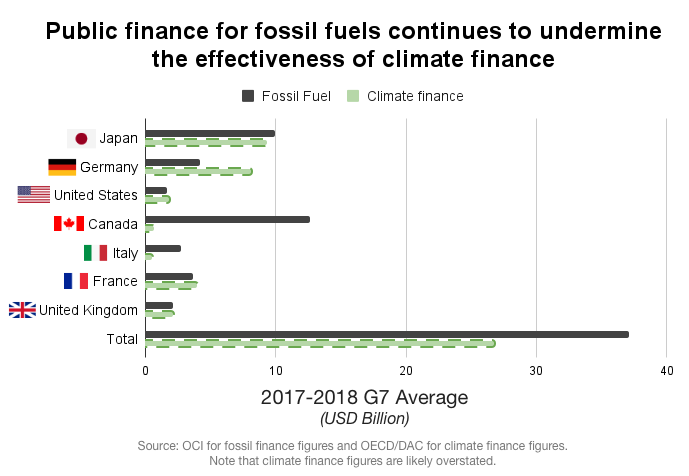All the majour parties in the recent Canadian Election put forward plans to address climate change. Analysis shows that the G7 countries need to spend far more to support climate change action.
John Woodside, in the National Observer, reports that World leaders are being urged to turn off the tap on fossil fuel subsidies. Hot on the heels of major climate announcements at the United Nations this week, more than 200 civil society organizations (CSO) from dozens of countries are calling for an end to public financing of fossil fuels. On Tuesday, Chinese President Xi Jinping said his country would axe financing for coal-fired power plants abroad, while U.S. President Joe Biden said his nation would double financial aid to other countries to support their transition to a cleaner economy.
“One of the levers that allows production to increase is financing from governments, and so that's why this (letter) calls for the end of international support to all fossil fuels,” said IISD policy adviser Vanessa Corkal.
Annually, G20 countries provide US$77 billion in fossil fuel subsidies, compared to $28 billion for clean energy, the letter says. On average, Export and Development Canada (EDC) pumps more than $13 billion annually into the fossil fuel industry, but money flows from the Business Development Bank of Canada, provincial governments, and other agencies, too. EDC is “the main culprit at the federal level, and interestingly, the incoming Liberal government does include in (its) platform a plan to phase out public financing of the fossil fuel sector –– including from Crown corporations like EDC,” said Corkal.1
A statement issued by Oil Change International reports that CSOs (civil society organizations) are calling on world leaders to end public finance for fossil fuels in 2021.
But momentum is growing to end overseas finance to not only coal but also oil and gas. In March 2021, the United Kingdom was the first major economy to adopt a comprehensive approach by announcing an immediate end to trade and development support for coal, oil, and gas. Several development banks, like the European Investment Bank, the Dutch development bank FMO, and the French Development Agency, have also adopted robust restrictions to their oil and gas financing. These governments and institutions are leading the way in aligning finance with the Paris Agreement. They have created examples that should be followed by others.2
The International Institute for Sustainable Development (IISD) is an award-winning independent think tank working to accelerate solutions for a stable climate, sustainable resource management, and fair economies. Our work inspires better decisions and sparks meaningful action to help people and the planet thrive. We shine a light on what can be achieved when governments, businesses, non-profits, and communities come together. IISD’s staff of more than 120 people, plus over 150 associates and consultants, come from across the globe and from many disciplines.
Tasneem Essop, Executive Director, Climate Action Network International, said:
"We can’t afford any more fossil fuels. The International Energy Agency has already stated that any new fossil fuel development is incompatible with the Paris agreement’s goals and 1.5 degrees celsius. Governments and public finance institutions have a responsibility to invest in a just energy transition shifting public finance out of coal, oil and gas and into renewable energy and supporting coal, oil and gas workers and communities. Pumping more public money into oil and gas projects in countries that are already bearing the brunt of the climate crisis will risk locking in stranded assets, burdening global South countries with further fiscal debt and will increase the threat of runaway climate change. We call on governments and public finance institutions to demonstrate increased political leadership on energy finance to ensure a sustainable, equitable and safe future for all."3
More than 50% of the popular vote in the recent Canadian election was for parties with aggressive climate emergency plans. The time is right to advocate for an end to fossil fuel subsidies in Canada now.
References

No comments:
Post a Comment